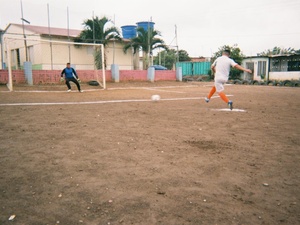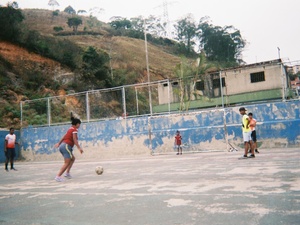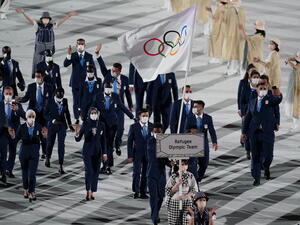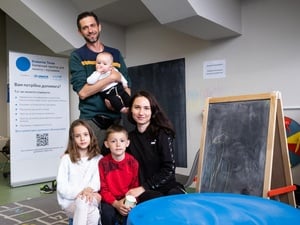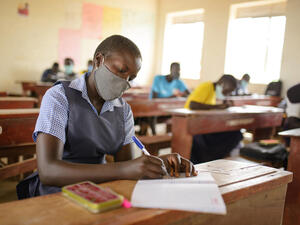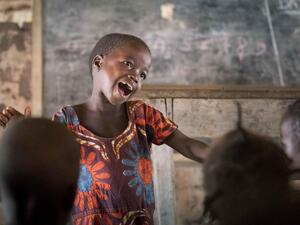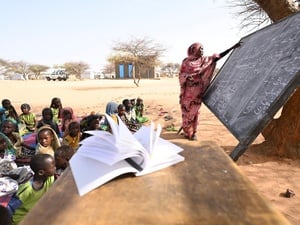Feature: Keeping young refugees on the ball in Sierra Leone
Feature: Keeping young refugees on the ball in Sierra Leone
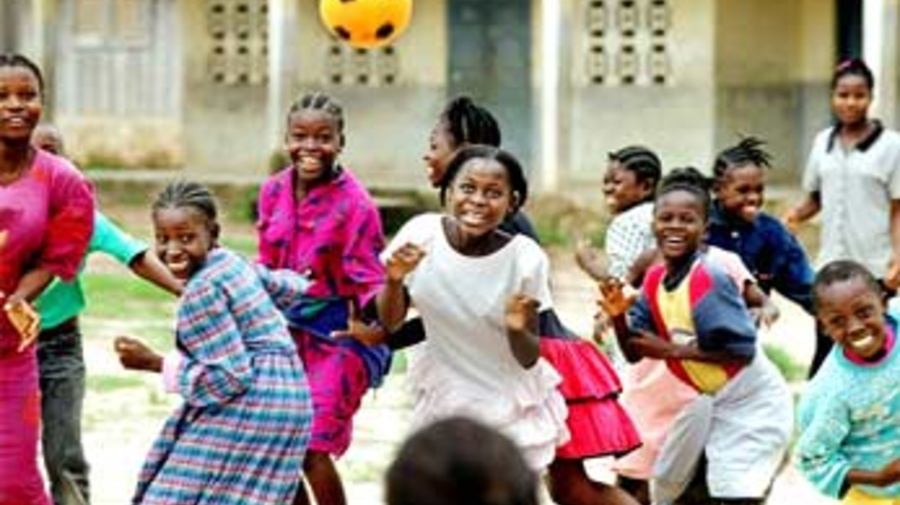
Refugee girls in Africa are encouraged to get active through Right to Play programmes.
FREETOWN, Sierra Leone (UNHCR) - A non-governmental organisation has set the ball rolling on sport and games in Sierra Leone's refugee camps in the hope that young refugees will be able to have fun with a purpose.
Since starting its programmes in Sierra Leone in March, Canadian-based group Right to Play has introduced football, volleyball, kickball, softball and ultimate frisbee to Liberian refugee youth in five camps. Besides keeping them active and channelling their energies into positive activities, these sports also teach them important values and life skills like self-confidence, teamwork, communication, inclusion, discipline, respect and fair play.
Seventeen-year-old Jestine Sayon fled the Liberian conflict in March last year, leaving her family of 24 back in Monrovia. She walked for two days and crossed the Gendema border into Sierra Leone, where she was moved to Gerrihun camp.
"I miss my family a lot but Right to Play made me feel right at home," said Jestine, who is now a volunteer coach in the camp. "I get a lot of affection from the children I work with, who call me trainer or simply 'Right to Play' girl."
In addition to coaching, the teenaged girl is also active in the camp's youth club, and offers training on issues related to gender-based violence in Gerrihun and other camps in the area. She is also keen to resume her studies, and is eagerly awaiting the results of a German-funded scholarship she applied for.
Jestine is a good role model for refugee girls, many of whom have to drop out of school and sport because of family obligations. To encourage more girls to participate in games, Right to Play recently worked with UNHCR to organise two special days of play for them.
"Children learn better when they are having fun and being active," noted Jestine. "I love working with them. They are very sociable even though they come from different parts of Liberia with different languages and traditions."
Sport brings people together, transcends boundaries and opens new dialogues. Psychologically, it reduces depression and improves concentration.
Besides girls, another target group is former child soldiers. Sport supports their reintegration into community, allowing them to interact with their peers, readapt to community life, strengthen their social skills and build meaningful relationships with adults.
To attract more refugee youth to its programmes, Right to Play organises monthly sensitisation campaigns around the camps. The coaches jump out of UNHCR vehicles and start performing drama, encouraging children to join them. The target group is girls and boys aged from 10 to 18.
"We are the only non-governmental organisation that arrives in camps to smiles and not complaints," quipped Rob Regent, one of the coordinators. "Sports interaction allows refugees to push back the horrors of war."
Twice a week, the Right to Play team - consisting of volunteer coordinators recruited from Australia, Europe and North America - visit the camps to play with and train refugee children and host communities.
Eventually, coaches are chosen from among the refugees, and trained to teach other refugee youth to play games and sport. This promotes community leadership and participation in the planning and implementation of the programme, which involves managing sport leagues and planning infrastructure construction and special events.
Despite limited resources - each camp receives about $2,000 a year - Right to Play spends at least three years on each project. This ensures adequate time to develop programme sustainability within the community in terms of trained teachers and coaches, sport activities and leagues and community equipment and infrastructure. Once these factors are in place, the organisation leaves the running of the projects to the refugee community.
Right to Play, formerly known as Olympic Aid, works in 18 countries around the world. The organisation is working to build a strong presence in Africa, with existing programmes in Angola, Benin, Ethiopia, Ghana, Guinea, Kenya, Mali, Mozambique, Rwanda, Sierra Leone, Tanzania, Uganda and Zambia.
By Francesca Fontanini
UNHCR Sierra Leone


